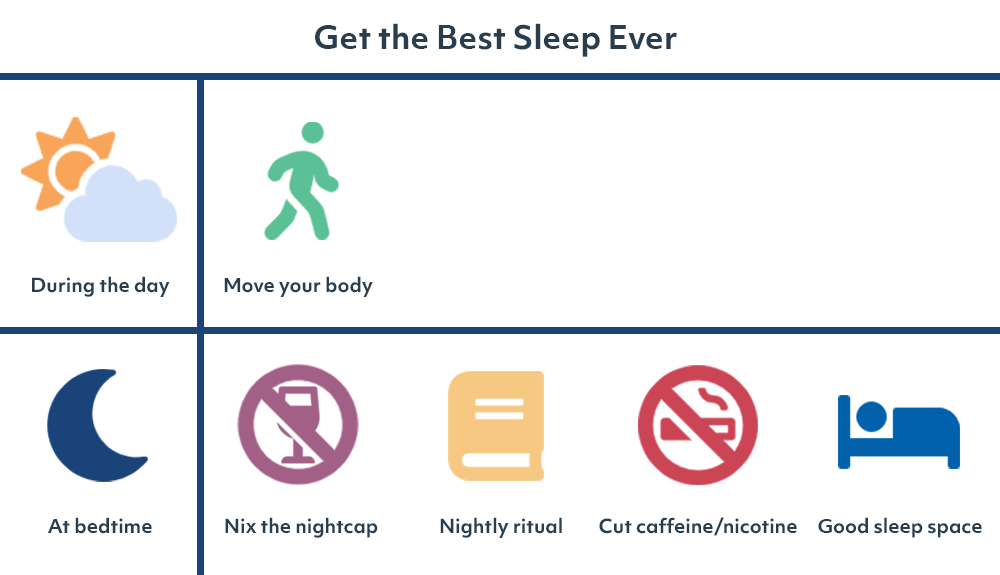How to get the best sleep ever.
Whether you’re trying to kick an addiction, be there for someone who is, or just plain live healthier in long-term recovery, sleep is crucial to reaching all your goals. If you’re having trouble sleeping, it affects everything from your sex drive to your memory. But if you’re reading this, you don’t need me to tell you that sleep is important. You get it, right?
So why are you still tossing and turning, obsessively flipping your pillow to the cool side, serenading your cat, or scrolling through your Netflix queue at four in the morning? Where are all the sheep and why can’t you count them? What is the problem, and more importantly, what is the solution? Just like you brush your teeth and eat three meals a day (or try to), your sleep cycle needs some care to ensure a good night’s rest. So how can you give you give your sleep cycle the tune up it needs to get the zzz’s you want?
The key to getting dreamy: better bedtime habits. Improving your sleep habits can take you from spending sleepless nights scrolling through your Instagram feed to getting a solid 8 to 10 every night. In 2015, the CDC recognized insufficient sleep as a public health problem, and recommended better sleeping habits as the solution.
Here are the best ways to help you get the sleep you deserve. (Hint: there’s room to improve around the clock!)
During the Day
Move your body.
Exercise is good for you. We get it. Another of exercise’s seemingly endless benefits? It’ll put you to bed. Not only does exercise boost your mood and reduce your stress levels, but it will tire you out physically, prepping you for sleep. You don’t have to exercise hard to sleep hard, though. As little as 10 minutes of exercise can help you get a better night’s rest.
Increase your exposure to sun or bright light during the day.
Increasing the amount of daylight your body experiences during the daytime helps to naturally regulate your circadian rhythm and helps to keep it healthy. Getting more sunshine or bright light into your room helps to provide your body with more energy during the day also.
Limit screen time after work hours.
Once you turn off your computer at the end of a busy day. Try to limit the amount of blue light exposure you are getting the closer you get to bedtime. This light exposure can trick your body into thinking it’s daytime and messes with your natural circadian rhythm. If you read on a tablet or smartphone before bed, try wearing blue light glasses to limit the amount of light exposure you are getting.
Create a schedule.
Setting a routine of waking up and going to sleep at the same time sets an internal clock for yourself. After a couple of weeks staying in this routine, your body should naturally wake up with more energy and wind down in the evening around the same time every day.
At Bedtime
Nix the nightcap.
Booze before bedtime is a common go-to for sleep issues. But not so fast! Alcohol, while it may help you drift off, can reduce your ability to achieve restorative sleep. Heavy drinking can affect chemicals in the brain that control sleep, and trying to quit drinking can also affect sleep patterns. If alcohol is getting in the way of your days and your nights, we’re here for you. Otherwise, try to limit your drinking to better focus on dreaming.
Find your own nightly ritual.
What soothes you? Chamomile tea, a soak in a bath bomb bubbling tub, attacking the graphic novel you say you never have time to read? Some light stretching with your pup by your side or a quick chat on the phone with your bestie? Find out what calms you down, and turn it into a routine. This will send the signal to your body and your mind that it is almost bedtime.
Cut out evening caffeine and nicotine.
Caffeine is a stimulant and can keep you up hours after consumption. Cut yourself off from coffee and energy drinks in the afternoon, if not before then, and watch the total amount you consume as well (a 4PM cut off is irrelevant if you chug 3 more Red Bulls than normal!). Remember that nicotine is also a stimulant, meaning that it can also keep you up and prevent you from getting deep sleep.
Head to bed in an environment worth dreaming about.
Your bedroom is super relevant to the quality of sleep you’ll get each night. So important that we devoted an entire article to bettering your sleep space.
Bad sleeping habits can leave you rummaging through the fridge at 2AM instead of getting the restful sleep you need. If you have tried all these suggestions and more, though, don’t be a hero; get checked out by a medical professional.
See you in dreamland!





